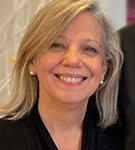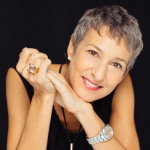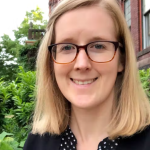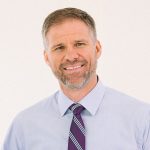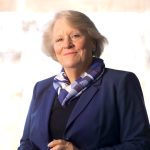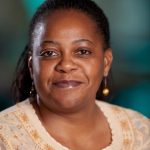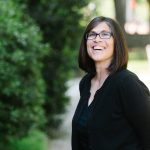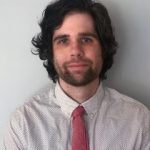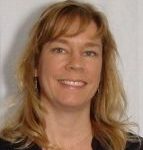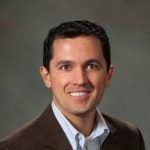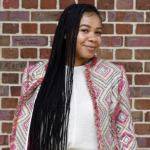
October 13, 2022
10:00 a.m.-4:00 p.m., The Friday Conference Center, Chapel Hill
1.0 CEU
$95
The K12 Global Education Symposium 2022 will explore pressing global issues impacting our world and address how educators can provide the tools and strategies to develop agency in students. Questions that we will explore at this one-day program through plenary talks and breakout sessions include: What are the greatest challenges and opportunities we face as a planet, and why is it important to know about them? Why should students be positive stewards and responsible actors of change to protect local and global communities? How can educators support students in developing the capacity to be actors of change?
Registration is full, but the waitlist is open!
Schedule Welcomers and Introducers Plenary Speakers Concurrent Session Speakers Sessions Program Materials Directions/Parking Support Provided By
Schedule
| 9:30 a.m. | Coffee and Continental Breakfast | |
| 10:00 a.m. | Welcome Charlé LaMonica, Director, World View, UNC-Chapel Hill |
|
| 10:15 a.m. | Accelerating Progress on the Sustainable Development Goals at Home and Abroad Krista Rasmussen, Policy and Research Officer, United Nations Foundation |
|
| 11:00 a.m. | Preparing the Next Generation to Solve Global Challenges Ambassador Barbara J. Stephenson, Vice Provost for Global Affairs and Chief Global Officer, UNC-Chapel Hill |
|
| 11:45 a.m. | Transforming Learning with a Senegalese Girl's Story BYkids: Real-world films for kids, by kids Holly Ornstein Carter, Founder and Executive Director, BYkids |
|
| 12:30 p.m. | Lunch (provided) | |
| 1:15 p.m. | CONCURRENT SESSIONS I 1. World Makers, World Changers: Students as Postmodern Book Artists Jocelyn A. Glazier, Associate Professor, School of Education, UNC-Chapel Hill 2. Harnessing the Learning Potential That Lies in our Differences Dionne Cross Francis, Associate Professor, School of Education, UNC-Chapel Hill 3. The Human Side of SDGs: The Case of Exploring Social Issues in the Galápagos Gina Chowa, Associate Dean, Global Engagement and Director, Global Social Development Innovations, School of Social Work, UNC-Chapel Hill |
|
| 2:00 p.m. | Break | |
| 2:15 p.m. | CONCURRENT SESSIONS II 4. STEM Teaching and Learning about the COVID Pandemic Troy Sadler, Professor Jasmyne Yeldell and Eric Kirk, Graduate Students School of Education, UNC-Chapel Hill 5. Developing Global Competencies to Support Student Agency Holly Loranger, Social Studies Teacher, Durham School of the Arts, Durham Public Schools 6. UNC in the Galapagos: People, the Planet, and You Diego Riveros-Iregui, Director, Center for Galapagos Studies and Professor, Department of Geography, UNC-Chapel Hill |
|
| 3:00 p.m. | Break and Transition to Main Room | |
| 3:15 p.m. | Issues-based Teaching and Learning: A Framework for Student Engagement with the World’s Most Compelling Issues Troy Sadler, Professor, School of Education, UNC-Chapel Hill Introduced by Fouad Abd-El-Khalick, Dean, School of Education, UNC-Chapel Hill |
|
| 4:00 p.m. | Closing Remarks and Adjournment Charlé LaMonica, World View, UNC-Chapel Hill |
Welcomers and Introducers
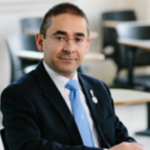 Fouad Abd-El-Khalick has served as dean of the UNC School of Education since July 2016. Abd-El-Khalick also holds the title of Professor of Science Education. He is a leading researcher on the nature of science and in particular its teaching, learning, and assessment in K-12 settings, as well as integration into preservice and in-service science teacher education. He has published extensively in science education and has held leadership positions in the field. He joined Carolina after 16 years at the University of Illinois, where he won awards for his teaching. Among his service, Abd-El-Khalick has served on N.C. Gov. Roy Cooper’s Governor’s Commission on Access to a Sound Basic Education. Dr. Abd-El-Khalick received his doctorate in science education from Oregon State University and an M.A. in Science Education from the American University of Beirut, Beirut, Lebanon.
Fouad Abd-El-Khalick has served as dean of the UNC School of Education since July 2016. Abd-El-Khalick also holds the title of Professor of Science Education. He is a leading researcher on the nature of science and in particular its teaching, learning, and assessment in K-12 settings, as well as integration into preservice and in-service science teacher education. He has published extensively in science education and has held leadership positions in the field. He joined Carolina after 16 years at the University of Illinois, where he won awards for his teaching. Among his service, Abd-El-Khalick has served on N.C. Gov. Roy Cooper’s Governor’s Commission on Access to a Sound Basic Education. Dr. Abd-El-Khalick received his doctorate in science education from Oregon State University and an M.A. in Science Education from the American University of Beirut, Beirut, Lebanon.
Director of UNC World View Charlé LaMonica has held service to the state front and center in her work. Since 2013, LaMonica has expanded UNC World View’s support of educators and increased partnerships in both rural and urban settings. LaMonica and the World View team have led more than 21 global study visits, taking K-12 and community college educators around the world to learn about educational systems, classroom experiences, history, business and culture. Since the founding of UNC World View in 1998, more than 25,000 teachers have participated in UNC World View programs from every county in North Carolina
Plenary Speakers
Holly Ornstein Carter is the Founder and Executive Director of BYkids. She started her career as a Pulitzer Prize-nominated journalist at The New York Times and has worked for 30 years as a journalist, editor, documentary filmmaker, fundraiser and non-profit leader. Holly founded BYkids in 2007 as a global movement that uses storytelling through film to inform, engage and inspire action. BYkids provides kids around the world with the training and the video cameras to make short documentaries about their lives and globally relevant issues. Renowned filmmakers mentor these young people in the art of filmmaking. In 2016 Public Television joined the Ford Foundation and Discovery Education as BYkids institutional partner. FILMS BYKIDS, the premier season of our five-part documentary series narrated by Ashley Judd, aired nationally on public television. Before founding BYkids, Holly ran the Global Film Initiative, a foundation bringing feature films from the developing world to major cultural institutions across the country. In 1999, Holly co-founded North Carolina’s Full Frame Festival, which has grown to become the largest documentary film festival in the world. During her tenure with The New York Times, Holly was part of the team nominated for a Pulitzer Prize for their coverage of the 1987 stock market crash and a writer and editor on the Editorial Page, for which she received numerous awards, including a Publisher’s Award. Holly lives in Manhattan with her husband and has two daughters.
Krista Rasmussen is an Officer of Policy and Research in the Policy Planning team at the United Nations Foundation, where she works on policy issues across the organization and identifies new trends and opportunities for the Foundation to advance its mission. Prior to joining the Foundation, she was a researcher in the Global Economy and Development program at the Brookings Institution. She has expertise in assessing global economic and social data, with a particular focus on the Sustainable Development Goals, financing for multilateral organizations, and food security. Her work has been published in World Development, The BMJ, and Global Policy Journal.
Troy Sadler is a professor of science education at the University of North Carolina at Chapel Hill School of Education and serves at the Thomas James Distinguished Professor of Experiential Learning. Sadler’s research focuses on how students negotiate complex socio-scientific issues and how these issues may be used as contexts for science learning. He is interested in how issues-based learning experiences can support student learning of science and development of practices essential for full participation in modern societies. He has also explored ways in which innovative technologies including virtual environments and gaming can support student learning. Sadler’s work has been funded by the National Science Foundation, the Institute of Education Sciences, the US Department of Education, the Howard Hughes Medical Institute as well as local foundations and state agencies. He has served in elected and appointed leadership roles in the world’s leading science education associations including NARST: A Worldwide Organization for Improving Science Teaching and Learning Through Research and the National Science Teachers Association. He is Co-Editor of the Journal of Research in Science Teaching, one of the world’s leading journals for science education research. Prior to his work at UNC, Sadler was a science education faculty member at the University of Florida and the University of Missouri and served as the director of a STEM education research center.
Barbara J. Stephenson, vice provost for global affairs and chief global officer, joined the University of North Carolina at Chapel Hill in 2019. She advances Carolina’s global reach, impact and reputation. Previously, she was president of the American Foreign Service Association. During her distinguished 34-year career in the Foreign Service, she was US ambassador to Panama, the first woman chargé d’affaires and deputy ambassador at the US Embassy in London, and dean of the Leadership and Management School at the Foreign Service Institute. She earned her PhD, MA, and BA in English literature from the University of Florida.
Concurrent Session Speakers
Gina Chowa first joined the UNC School of Social Work staff in 2008 as an assistant professor and now serves as a full professor and as Associate Dean for Global Engagement. Gina is the founding director of Global Social Development Innovations, which launched in 2017. Informed by more than two decades of experience and practice, Dr. Chowa conducts research at the intersection of economic security, workforce development, social protection, and financial inclusion and its impact on marginalized individuals in the Global South. Gina is an award winning scholar and her work has been published in various interdisciplinary and social work journals, including Child and Youth Services, Children and Youth Services Review, International Journal of Educational Development, Journal of Family and Economic Issues, Journal of Socio-Economics, and more. Gina also has faculty appointments at the Center for Social Development at Washington University in St. Louis, Mo., and the Centre for Social Development Africa at the University of Johannesburg, South Africa. Gina received her PhD and MSW from Washington University and a bachelor’s degree from the University of Zambia.
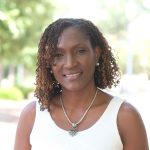 Dionne Cross Francis, is the Joseph R. Neikirk Term Professor in the Culture, Curriculum and Teacher Education Program at the University of North Carolina at Chapel Hill. Her research focuses on understanding both the contextual, cultural and teacher-specific factors that motivate teacher actions as they plan and instruct with the goal of determining the optimal design features of professional development that allow teachers to thrive. Results of this work have informed the design and implementation of professional development initiatives nationally (Indiana, Georgia) and internationally [Jamaica, Turkey, Kosovo, South Sudan, Ghana (upcoming)]. Dr. Cross Francis has been awarded the national K-12 Promotion of Education award for promoting STEM education from the 2014 Women of Color STEM Conference, the Oak Ridge Associated Universities’ Junior Faculty Enhancement Award, the American Psychological Association Division 15 Early Career Award and the University of Georgia’s Young Alumni Award. The IU School of Education also awarded her the Students’ Choice for Excellence in Teaching award, the Graduate Student Mentoring award and the Trustee’s Teaching Award for her work with pre-service teachers and graduate students. She is a co-editor and co-author of two books, Research on Teacher Identity: Mapping Challenges and Innovations (2018) and Teachers’ Goals, Beliefs, Emotions, and Identity Development: Investigating Complexities in the Profession (in press). Her work has also been featured in top journals in the field, including Journal of Mathematical Behavior, Journal of Mathematics Teacher Education, Teacher College Record, Educational Studies in Mathematics and Teaching and Teacher Education.
Dionne Cross Francis, is the Joseph R. Neikirk Term Professor in the Culture, Curriculum and Teacher Education Program at the University of North Carolina at Chapel Hill. Her research focuses on understanding both the contextual, cultural and teacher-specific factors that motivate teacher actions as they plan and instruct with the goal of determining the optimal design features of professional development that allow teachers to thrive. Results of this work have informed the design and implementation of professional development initiatives nationally (Indiana, Georgia) and internationally [Jamaica, Turkey, Kosovo, South Sudan, Ghana (upcoming)]. Dr. Cross Francis has been awarded the national K-12 Promotion of Education award for promoting STEM education from the 2014 Women of Color STEM Conference, the Oak Ridge Associated Universities’ Junior Faculty Enhancement Award, the American Psychological Association Division 15 Early Career Award and the University of Georgia’s Young Alumni Award. The IU School of Education also awarded her the Students’ Choice for Excellence in Teaching award, the Graduate Student Mentoring award and the Trustee’s Teaching Award for her work with pre-service teachers and graduate students. She is a co-editor and co-author of two books, Research on Teacher Identity: Mapping Challenges and Innovations (2018) and Teachers’ Goals, Beliefs, Emotions, and Identity Development: Investigating Complexities in the Profession (in press). Her work has also been featured in top journals in the field, including Journal of Mathematical Behavior, Journal of Mathematics Teacher Education, Teacher College Record, Educational Studies in Mathematics and Teaching and Teacher Education.
Jocelyn A. Glazier is an associate professor in UNC-Chapel Hill’s School of Education. During her time at Carolina, Glazier has served in a number of leadership roles and has developed partnerships with local schools and community organizations to support community-based and experiential learning in teacher education. At the local and national level, Glazier has mentored new teachers in a teacher induction program she helped establish called Reconnect and Recharge. She has also mentored teacher education faculty in the national Global Teacher Education Fellows Program. Through Glazier’s teaching and research, she seeks to support pre-service and in-service teachers in creating and enacting meaningful, equitable and transformative curricula and pedagogy. Her current scholarship explores the potential of embedding experiential education in teacher education to shift pre-service and in-service teachers’ beliefs and practices and their PK-12 students’ experiences of school. Her work is guided by commitments to equity and social justice, informed by her extensive work with school and community partners, including in her role as a high school English teacher, a facilitator of school-based communities of practice and active participant in district-wide initiatives to support equity in schools.
Eric Kirk is a doctoral student in the Learning Sciences and Psychological Studies program at UNC. He is interested in how experiences in the science classroom can be designed to support civic discourse and decision-making in the context of polarizing, moral issues – particularly those that involve the environment. Currently, he is working on projects that study how students think about and represent complex systems, how we may better assess the skills needed to think about complex systems, how these skills interact with students’ reasoning about contentious issues, and how individuals obtain and evaluate information about contentious issues. Before arriving at UNC, Eric was a biology and environmental science teacher in Atlanta.
Holly Loranger, a National Board Certified educator, teaches high social studies at Durham School of the Arts in Durham, NC. She also serves on the Board of Directors for the NC Council of the Social Studies. Prior to her current role, Holly served as UNC World View’s assistant director and lead professional development programs across the state. She also taught at Chapel Hill High for 16 years and worked in adult education at several community colleges. Holly received her B.A. in anthropology and sociology from the University of Notre Dame and her Master’s in teaching secondary social studies from UNC-Chapel Hill. She is currently pursuing her Ed.D. in Curriculum and Instruction. Throughout her educational career, she has been committed to global education, continually building global connections into the curriculum and working with diverse community members, from combat veterans to religious leaders to survivors of genocide, to foster relationships and deepen curriculum. Holly has participated in teaching exchanges and programs abroad in Turkey, Jordan, Austria, the Czech Republic, Germany, China and most recently in Zimbabwe.
Diego Riveros-Iregui is Co-Director, Center for Galápagos Studies at UNC-Chapel Hill and a professor in the Department of Geography. Riveros-Iregui’s research focuses on watershed science, forest and soil processes, ecosystem ecology, and human-water-environment interactions. Before coming to Carolina in 2013, he worked as a post-doctoral research associate at the University of Colorado and as an assistant professor at the University of Nebraska. His field studies include subalpine forests of the Rocky Mountains of Montana and Colorado, agricultural landscapes of Nebraska and Iowa, and highly impacted sites of the Andes Mountains of Colombia and the Galápagos Islands in Ecuador. Prof. Riveros-Iregui teaches courses on hydrology, watershed science, environmental systems, and field methods in physical geography. He regularly teaches a field course on Tropical Ecohydrology to UNC students who travel with him to the Galápagos Islands.
Troy Sadler is a professor of science education at the University of North Carolina at Chapel Hill School of Education and serves at the Thomas James Distinguished Professor of Experiential Learning. Sadler’s research focuses on how students negotiate complex socio-scientific issues and how these issues may be used as contexts for science learning. He is interested in how issues-based learning experiences can support student learning of science and development of practices essential for full participation in modern societies. He has also explored ways in which innovative technologies including virtual environments and gaming can support student learning. Sadler’s work has been funded by the National Science Foundation, the Institute of Education Sciences, the US Department of Education, the Howard Hughes Medical Institute as well as local foundations and state agencies. He has served in elected and appointed leadership roles in the world’s leading science education associations including NARST: A Worldwide Organization for Improving Science Teaching and Learning Through Research and the National Science Teachers Association. He is Co-Editor of the Journal of Research in Science Teaching, one of the world’s leading journals for science education research. Prior to his work at UNC, Sadler was a science education faculty member at the University of Florida and the University of Missouri and served as the director of a STEM education research center.
Jasmyne Yeldell is a doctoral student in the Curriculum, Culture, & Teacher Education (CCTE) program at the University of North Carolina at Chapel Hill within the School of Education. Her primary focus within the CCTE program is science education, with research focusing on the science identity formation processes of children of color in addition to equitable science curriculum development and hands-on science education. Jasmyne is a member of the Science Education & Experiential Learning (SEEL) Research Team where she works on the Multiple Models Project (MMP) studying equitable modeling practices. She is also a Research Assistant for the I CAN PERSIST [ICP] STEM Initiative at UNC; a culturally responsive, evidenced-based program that aims to advance academic and career persistence among women and girls of color interested in pursuing science, technology, engineering, and mathematics fields.
Sessions
1. World Makers, World Changers: Students as Postmodern Book Artists
Jocelyn A. Glazier, Associate Professor, School of Education, UNC-Chapel Hill
A picture book is considered postmodern if its features somehow offer the reader opportunities to think differently or divergently about the world and his/her place in that world (Paugh, 2014, p. 102). This breakout session includes opportunity for participants to become familiar with the features of postmodern picture books. In addition, session participants will be invited to “play” with texts so as to experience the sorts of activities they might engage with their own students. Finally, examples of student created postmodern picture books will be shared with participants.
2. Harnessing the Learning Potential That Lies in our Differences
Dionne Cross Francis, Associate Professor, School of Education, UNC-Chapel Hill
It’s not better, it’s not worse, it’s just different! There is often a lot we can learn from what is “different”. In this discussion, we will highlight the enormous learning potential of cross-cultural interaction for all learners. Drawing on examples from experiences with teachers and students in Ghanaian classrooms, we explore what we can learn from under-resourced yet culturally-rich environments.
3. The Human Side of SDGs: The Case of Exploring Social Issues in the Galápagos
Gina Chowa, Associate Dean, Global Engagement and Director, Global Social Development Innovations, School of Social Work, UNC-Chapel Hill
The ability to address the needs of people while protecting the environment is a delicate balance. This presentation explores ways of engaging people using participatory methods. These methods pursue and promote wellness for people in inclusive ways and factor in the human dimension to conserve the environment.
4. STEM Teaching and Learning about the COVID Pandemic
Troy Sadler, Professor
Jasmyne Yeldell and Eric Kirk, Graduate Students
School of Education, UNC-Chapel Hill
In this session, we will explore STEM teaching and learning opportunities associated with COVID and pandemics more generally. As the COVID pandemic swept across the world, students (along with most of us) had serious questions about the virus, vaccines, health sciences, etc. This situation presented opportunities to connect STEM learning experiences to issues that mattered most to learners. Unfortunately, the STEM education community was under-prepared for this situation. Our team has been working to address this challenge through creation of curriculum to help teach about various dimensions of the COVID crisis. We continue to work toward better understanding how students make sense of complex issues like an emerging pandemic. In the session, we will share teaching and learning materials and introduce opportunities to get involved in ongoing efforts to support student thinking about challenging, global issues.
5. Developing Global Competencies to Support Student Agency
Holly Loranger, Social Studies Teacher, Durham School of the Arts, Durham Public Schools
In this session we will explore what knowledge, skills, attitudes and values are necessary for global competency to promote global learning and student agency across the curriculum. Together we will discuss how educators can empower students to be responsible actors of change to protect or better local and global communities. Resources will be shared that help educators and students investigate the world in relevant and authentic ways.
6. UNC in the Galápagos: People, the Planet, and You
Diego Riveros-Iregui, Director, Center for Galapagos Studies and Professor, Department of Geography, UNC-Chapel Hill
In this presentation, Dr. Riveros-Iregui will describe UNC Chapel Hill’s activities in the Galápagos Islands over the last 10+ years. He will offer examples of research, teaching, and outreach activities that span primarily across two themes. The first theme involves activities by faculty and students in the Galápagos and Ecuador more broadly. The second theme involves outreach and professional development activities in North Carolina, targeting audiences that range from K-12 populations to college students to the general public of North Carolina.
Program Materials
To receive 1.0 CEU you must attend the program and turn in a completed study guide. Study guide information will be emailed directly to all registered participants.
Directions/Parking
The Symposium is at the Friday Conference Center
100 Friday Center Drive
Chapel Hill, NC 27517
Click here for directions.
DOWNLOAD YOUR PARKING PASS FOR THE FRIDAY CONFERENCE CENTER HERE.
Support Provided By
Advocate Level Support Provided By:


